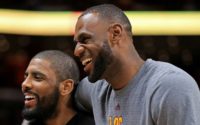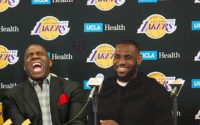LeBron Slams The NCAA, Nods At The NBA’s Role In The Mess
LeBron James would never make a step back when it comes to supporting young talented players. He added another major issue to his political resumé this weekend. The Lakers star talked to California Governor Gavin Newson on The Shop. They discussed the new bill that would allow college athletes to profit of their name. Maverick Carter, Diana Taurasi, Katelyn Ohashi, Rich Paul and Ed O’Bannon joined the discussion. The bill will take effect in 2023, and it pressures the NCAA to work on a national solution to change the rules for athletes who need to make money off of their endorsement.
The NCAA released an official statement following the signing of the bill.
“As a membership organization, the NCAA agrees changes are needed to continue to support student-athletes, but improvement needs to happen on a national level through the NCAA’s rules-making process. Unfortunately, this new law already is creating confusion for current and future student-athletes, coaches, administrators and campuses, and not just in California.
“We will consider next steps in California while our members move forward with ongoing efforts to make adjustments to NCAA name, image and likeness rules that are both realistic in modern society and tied to higher education.
“As more states consider their own specific legislation related to this topic, it is clear that a patchwork of different laws from different states will make unattainable the goal of providing a fair and level playing field for 1,100 campuses and nearly half a million student-athletes nationwide.”
Law firm Kennyhertz Perry predicted the future development of events.
“By using the term “tethered to education” in its release, it’s clear that any NILrules proposed by the NCAA will attempt to fit within the Ninth Circuit’s O’Bannon decision. As a result, it’s highly unlikely that the NCAA will propose a plan where athletes can be paid directly by third parties (such as for appearing in a commercial or signing autographs) or are automatically entitled to cash payments that they can access after they leave school. Doing so would contradict the O’Bannon appellate decision and put its precedential value at risk. More likely is a plan where athletes may engage in activities where they are paid for the use of their NIL, but any money earned is put into a fund that can be accessed as a result of meeting specified academic benchmarks, such as maintaining a certain GPA, meeting yearly academic progress requirements, or graduating.”



